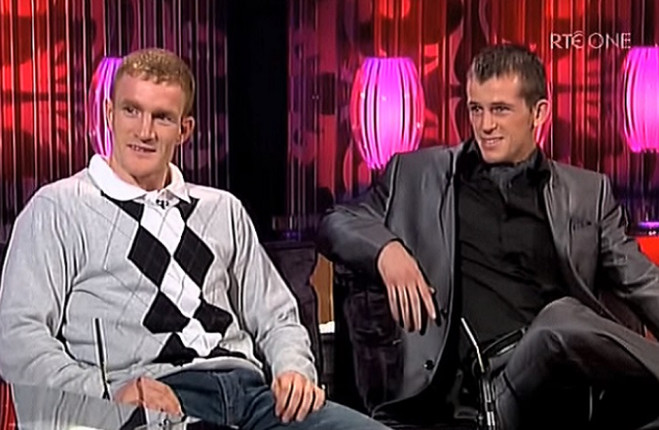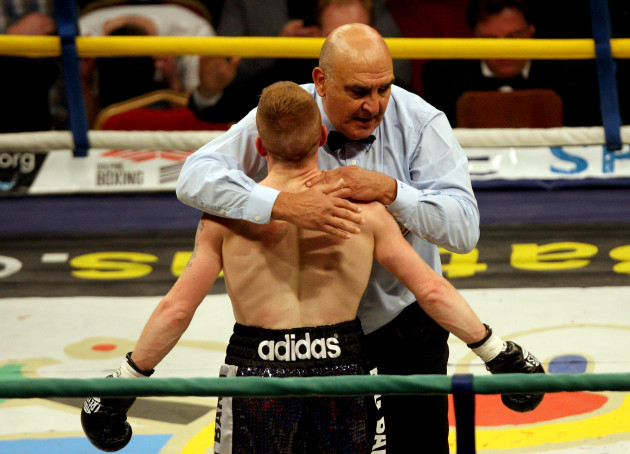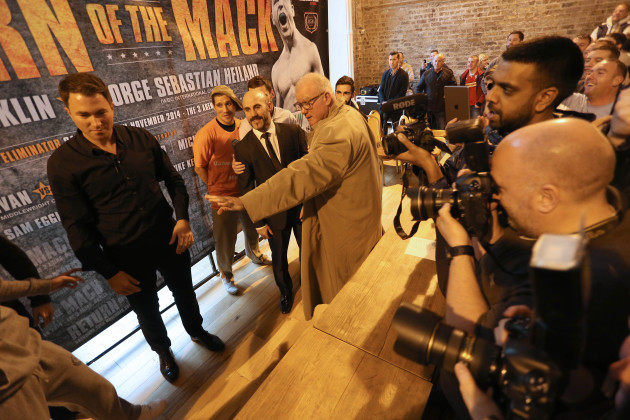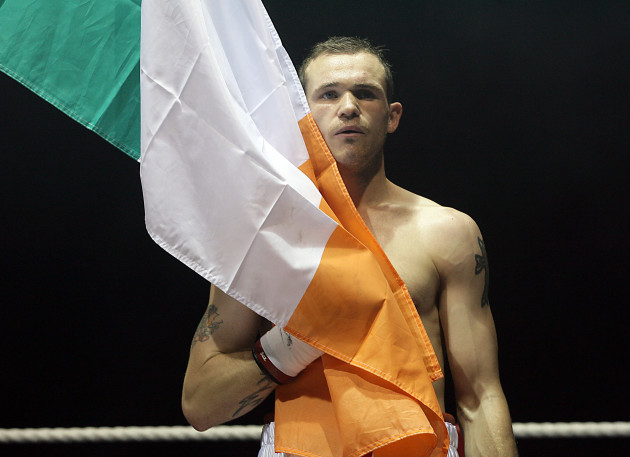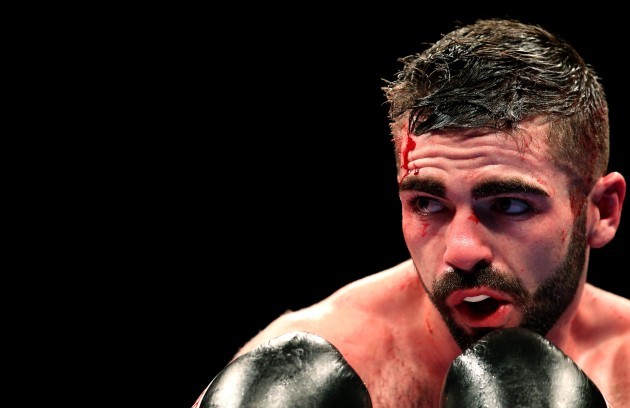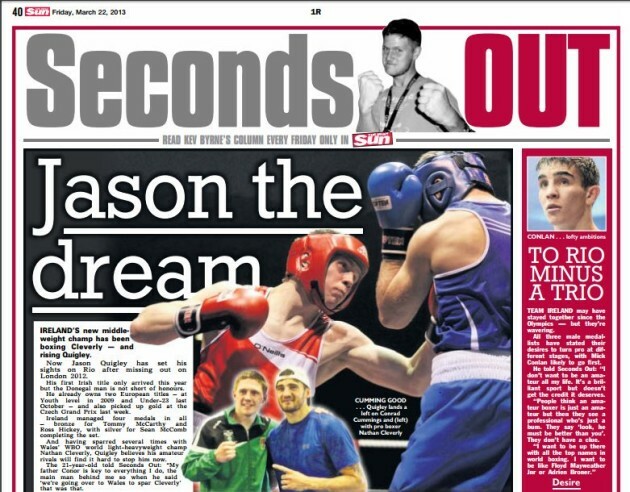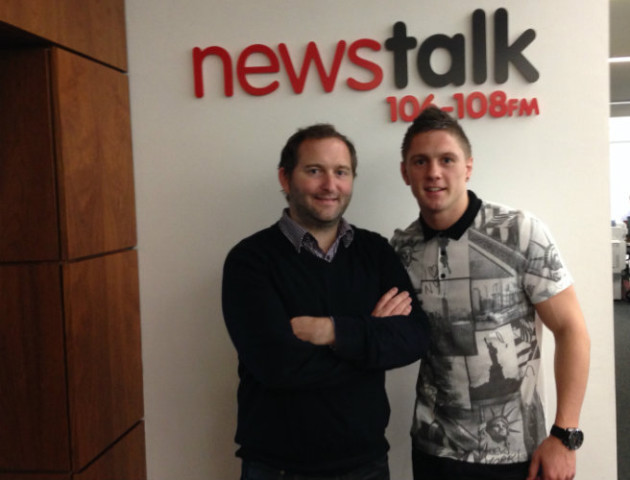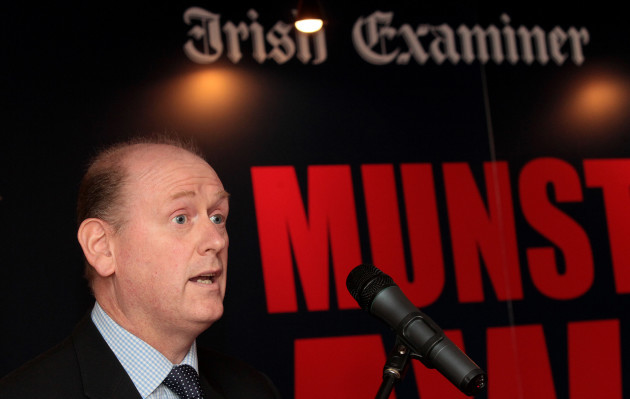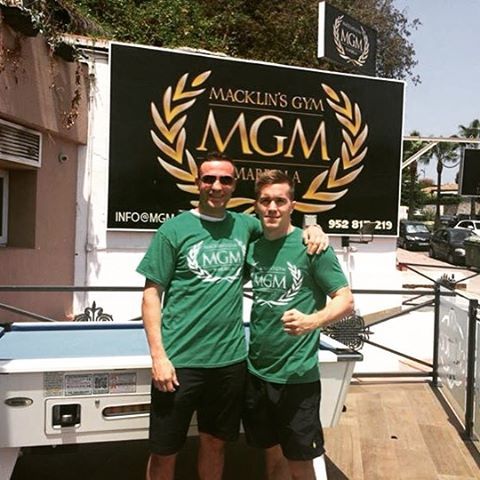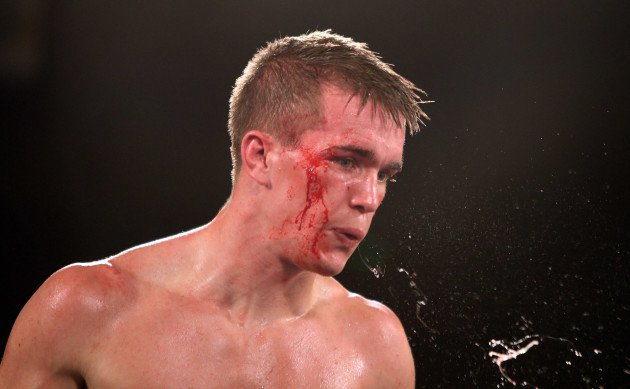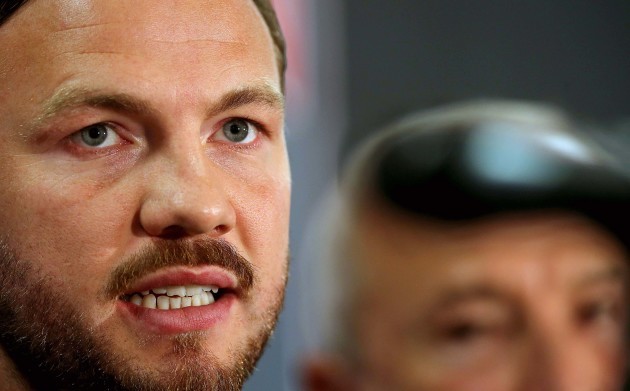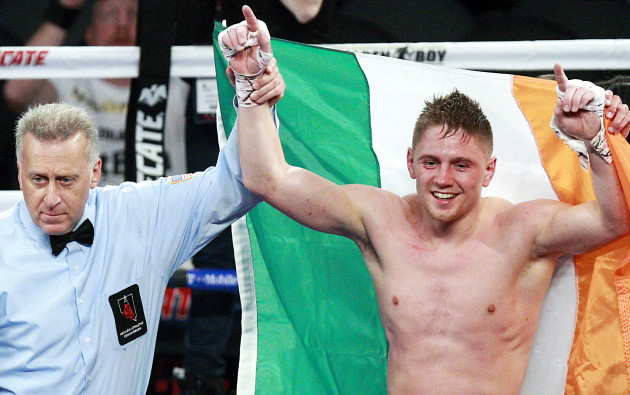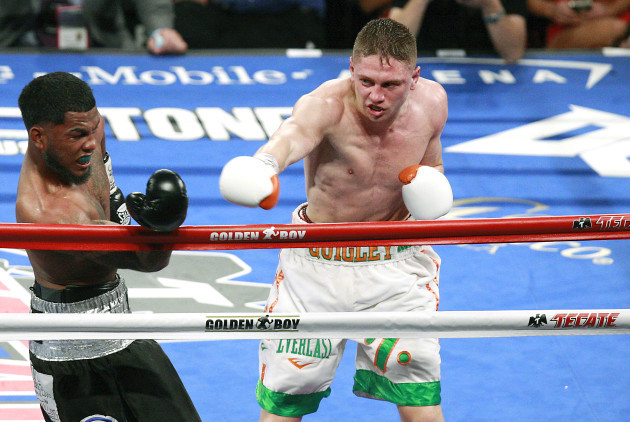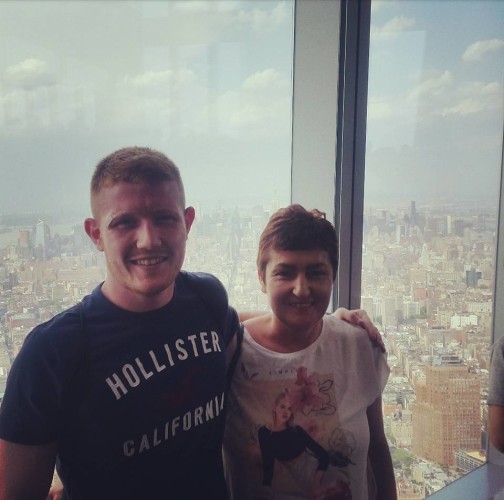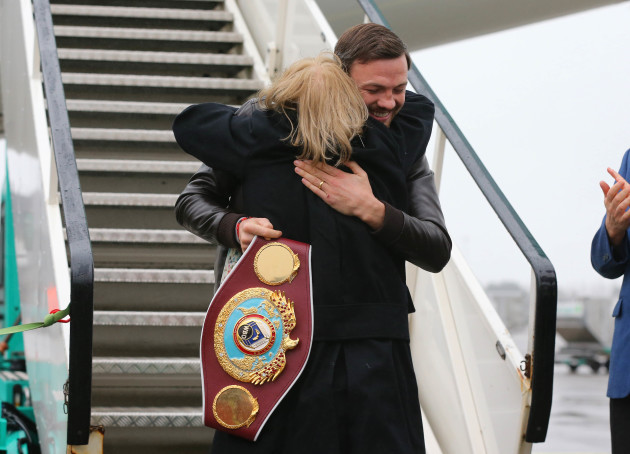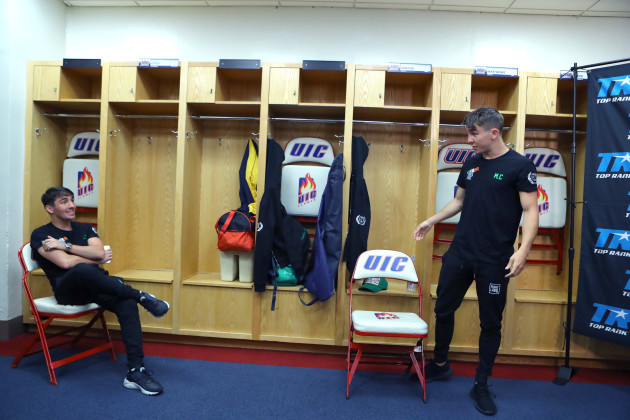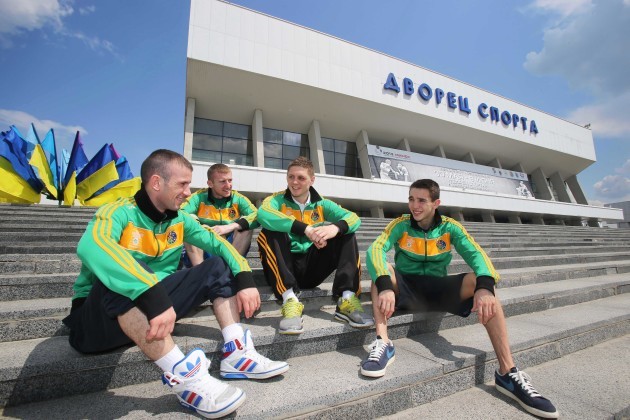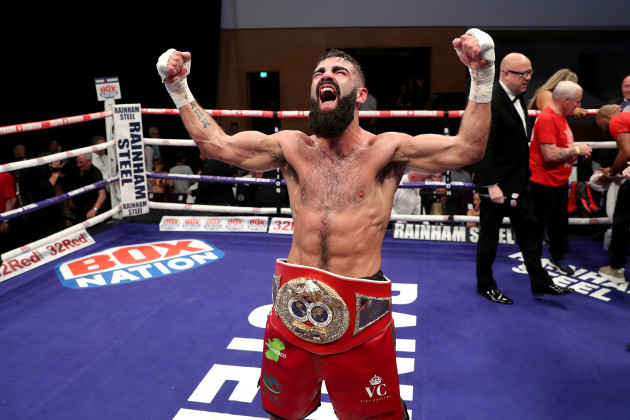AS WE APPROACHED the summer of 2016, professional boxing in the Republic of Ireland had plummeted to its lowest ebb in recent history.
Having been decimated more so than most sports during the economic downturn, the situation facing the pro game was exacerbated by the tragic events which had unfolded during a weigh-in at the Regency Hotel in February. With Dublin effectively ruled out as a host city for professional cards, many of the country’s finest fighters were left starved of opportunities to showcase their talents, with a large number facing the prospect of emigration if they wished to further their careers in the ring.
The following examination of the sport’s plight was written in May of 2016, and includes interviews with a number of high-profile Irish fighters on either side of the Atlantic, as well as members of an Irish media often criticised for its perceived failures to cover these fighters’ careers.
As boxing continues to awaken from its slumber, the intervening 14 months have seen some of the careers described, as well as the sport itself in Ireland, transformed for the better.
Originally written in May 2016; first published on 23 July 2017
CHAPTER ONE: The stagnation of professional boxing in Ireland
AT 11PM ON 19 March 2011, professional boxing in Ireland was dealt a vicious body-blow by way of Cuba.
To a cacophony of piercing gasps from an audience of roughly 3,500 feverish fight fans at Dublin’s Citywest Hotel, Willie ‘Big Bang’ Casey slumped into referee Stanley Christodolou’s arms. Defiled. Dejected. Defeated.
In a singular stanza, the Limerick super-bantamweight had found himself on the receiving end of a barrage of needle-like left hooks to the body and head-snapping jabs. A storm had blown in from Central America, and Casey – who carried the hopes of an expectant nation on his slight frame that Saturday night – had been blown halfway out of the ring.
Having dethroned former Bernard Dunne victim Ricardo Cordoba of Panama just four months previous, it had taken two-time Olympic gold medallist Guillermo ‘El Chacal’ Rigondeaux 169 seconds to ensure that he remained the WBA super-bantamweight champion of the world.
“It’s all over,” cried Jimmy Magee, as the lights began to dim on RTÉ’s big-fight coverage.
“Willie Casey – a great big bang, a great heart, a great fellow. But the Roy of the Rovers story for him, I’m afraid, has a bitter ending.”
The only decipherable ‘big bang’ was the pin being thrust into the balloon.
Considering the monumental success of Dunne – the cocksure Dub whose career had culminated in an iconic Irish sporting moment at The Point in 2009 – the Irish boxing community could scarcely have expected that Casey’s sobering defeat a mere two years later would transpire to be professional boxing’s swansong on terrestrial television.
Five years removed from the Rigo-Casey non-event, which now manifests itself as a faded memory in the very bowels of Irish boxing’s collective subconscious, professional boxing in Ireland has all but ground to a halt.
It begs the question as to whether the current crop of indisputably talented fighters can reinvigorate the sport, and in turn, rediscover the ‘boom times’ of the late noughties, or indeed whether that’s even possible given the current lack of promotion, resources and infrastructure conducive to sustaining a healthy professional pugilistic scene on this island, and particularly in the south.
According to one protagonist, that remains little more than a pipedream.
“We definitely don’t get the same level of attention as many other sports,” says Cork middleweight Gary ‘Spike’ O’Sullivan.
“Foreign sports like soccer obviously get far more publicity than the boxing in Ireland. It’s tough, like. It’s just a tough sport to make money in anyway, and without the media, it makes it even harder.”
O’Sullivan is recovering having suffered a perforated eardrum in his world title eliminator with archfoe Chris Eubank Junior at London’s O2 Arena in December. He learns his trade in Corduff’s Celtic Warrior Gym, and is trained in part by former two-time world champion Steve Collins – whose rivalry with Chris Eubank Senior in the mid-’90s became so feral that it remains embedded at the forefront of Irish and UK boxing folklore – but predominantly by Collins’ brother Paschal, one of Ireland’s most highly regarded professional tutors.
Aged 31, O’Sullivan’s record now stands at 22-2(15 KOs), i.e. 22 victories, two defeats, and 15 triumphs by way of stoppage. He has recently made the decision to drop down a weight division to make one last stab at world honours, but confesses that without a fight in the pipeline, he’s finding it difficult to remain motivated in the gym.
That’s not his gripe today, however:
“RTÉ definitely have far more responsibility to show boxing, especially considering it’s our number one sport – as in, in terms of winning things at both professional and at amateur level,” he says, his Corkonian twang almost out of place amidst the ‘musical’ intonations of the Dubs who surround him in the gym.
“You’ll have the Euros coming up again there in June and, realistically, what chance do Ireland have of winning it? Even though I’ll be cheering my head off for them myself, hoping they do well. But we have far more chance of having a world boxing champion or a European boxing champion than we do in soccer.
Even the GAA players that you can’t get a word out of in the media – these lads are idiots. They’re so far up their own backsides it’s surreal. At the end of the day, what are they? They’re not performing at an international level; they’re performing between themselves.
‘Spike’ maintains that boxing is now “almost looked down upon” in Ireland. He deems its working class roots incompatible with the mainstream media narrative, and explains how, had he not a young family and another baby on the way, he’d traverse the Atlantic in a New York minute. In America, he explains, he often finds himself speaking on Fox Sports one second and promoting his upcoming fight on another major network the next.
In Ireland, there’s nothing of that magnitude.
The former Irish champion is far from the only fighter on this island who can’t help but glance west to pastures greener on occasion. In 2016, his dissatisfaction with the Irish boxing landscape is far from unique.
On the 12 March this year, Tallaght featherweight Patrick Hyland announced to his Facebook friends that he would be challenging former US Olympian Gary Russell Junior for the WBC World title in April – a historic feat for an Irish fighter in that only one Wayne McCullough had ever gotten his paws on a WBC belt before.
In an impassioned rant, Hyland lambasted the Irish sports media for his having to break the news on Facebook at all. ~He also expressed his gratitude toward those who had supported him throughout his career – particularly last year, when he tragically lost his father and trainer, Paddy, to suicide.
“The message I put out on Facebook was just to let my friends know that I was fighting for the world title, because not many people would have known without the media putting it out there,” he explains.
“Until the final week before I went over to America, there really was no coverage, especially for a fight of such significance – both for myself and for the country.”
“Now, there has been a bit of a downslide in Irish boxing with the Regency and recent events, but I was thinking if something good could possibly come from Irish boxing then it should be publicised more by the media.”
Hyland’s is a career path less travelled but all the more storied for it; for two years, while living in America, his boxing promoter was Nicole ‘Snooki’ LaValle (née Polizzi), of MTV’s Jersey Shore fame, whom he describes as “a typical celebrity: The face of the organisation, but behind the scenes a lovely girl and an extremely good businesswoman.”
To put the Rocky-like nature of ‘The Punisher’s’ world title tilt against Russell Jr into context, it’s worth pointing out that the 33-year-old works a full-time job in Dublin – the same job he’s had since he was 17.
“To be fair,” he says, “some boxers, from the start they get great help on the promotional side of things, and they get looked after from day one with food, sponsors and everything they could ask for, so they can train full-time and they don’t have to work.”
“I’d class myself, now, as more of a semi-pro, because I work at something else full-time. And the people I work for have been so good to me – with the big fight like the last one I can take four or five weeks off, or when I’m doing my hard sparring I can take days off, so I stay loyal to them.”
Hyland entered his title contest in Connecticut as a 7/1 underdog, and was brutally stopped by his elite-level opponent in the second round.
He laughs as he recalls the long flight home and the almost immediate return to his nine-to-five, exclaiming: “As I said to my wife, Lorna, after I went back to work on the Monday: Reality hit me quicker than Gary Russell Jr!”
However, despite the perceived lack of hype surrounding what amounted to a borderline quixotic task in America’s north-east, Hyland points to the recent chapter of another Irish fighter’s career as perhaps the most damning indictment of the current professional scene in his homeland.
“Andy Lee was a world middleweight champion boxer and tried to have a fight in Limerick and – now, I’m not too sure because I know he had a virus or something as well – but I heard the ticket sales weren’t going great.
I just don’t get that. A world title fight in Thomond Park? I remember thinking to myself, ‘why isn’t this sold out already? This should have been sold out in two or three days’. And then it gets moved to Manchester. Our world champion had to go to Manchester to defend his title. It’s disgraceful.
Having admonished the fact that a significant portion of the Irish population is willing to spend a fortune in order to support Conor McGregor – a friend of his – in America, ‘The Punisher’ recalls December 2014, when Lee’s own Vegas odyssey saw him dismantle the undefeated Russian Matt Korobov inside six rounds, thus becoming the first Irish boxer since the great Jimmy McLarnin in 1934 to win a world title on US soil.
“Andy Lee stopped the guy and won the belt but he got like, what, five minutes at the end of The Late Late Show? That’s a serious problem for the sport over here.”
But whereas Spike O’Sullivan and Hyland have borne witness to both the good and bad sides to the Irish boxing paradigm throughout the past decade, both men are approaching the respective twilights of their careers as leather tradesmen.
Regardless of the sport’s stagnation here, the conveyor belt will continue to churn out fighters, the next crop born of the ’90s – young boxers who know nothing but financial difficulty having endured five years of dwindling resources and opportunity.
One man of such ilk is 23-year-old lightweight Jono Carroll, who – like Willie Casey before him – came from nowhere to win Sky Sports’ Prizefighter competition in 2014.
That December Saturday night at 8pm, Carroll – who had only recently re-emerged on the Irish boxing radar having previously emigrated to Australia to find other employment – entered the ring as a relatively unheralded, three-fight novice. At 11:15pm, the charismatic ‘King Kong’ exited stage left as a red-hot pugilistic prospect with a record of 6-0, and held victories over a former European champion, a current British champion and, perhaps more pertinently, a cheque for £32,000 – some of which he later used to fund his sister’s honeymoon.
But in spite of its auspicious beginning, Carroll’s career is equally representative of the pro game’s stagnation in Ireland. Since his Prizefighter victory he has fought just four times in 16 months, and the man who once rendered the Paddy Power store in his native Dunshaughlin cashless is now feeling the pinch himself.
“There’s times where I’ve gotten to the stage where I’m almost looking for jobs,” he says.
The five-foot-six ring magician pauses and strokes his beard, conspicuously uneasy having heard himself utter aloud the words that have bounced about his head for some months now.
“I can’t survive on just fight money, because, like, my last fight was the Klitschko card which was nearly seven months ago now.
“I have one great sponsor, so don’t get me wrong, I won’t need to go without gloves or headguards or things like that. But obviously he can’t give me a steady wage every week. There’s nobody in Ireland giving you cash. It’s very hard to find anybody who’ll cover your training fees, and you need to pay guys to come over from abroad and spar; you need to feed them and put them up and everything else.”
Having inked a promotional deal with Matchroom and Eddie Hearn – the major drivers of the sport in the UK – it seemed not even Sky was the limit for the now 10-fight undefeated Carroll. But the stylish southpaw is under no illusions as to why businesses might be hesitant to invest in an Irish boxer.
I look at it from the sponsor’s point of view: If I’m not being shown on tv, then the only thing they’re getting out of it is a tweet or a message on Facebook to say thanks. So I understand why it’s hard to get sponsorship, and I understand times are kind of tight at the minute, so what can you do?
Even Carroll, potentially one of the most accessible and entertaining characters in Irish sport, is left feeling aggrieved at the perceived lack of media coverage both he and his boxing brethren receive from national outlets.
But as invariably tends to be the case in a sporting environment as turbulent as boxing’s, there are at least two sides to every story.
CHAPTER TWO: Professional boxing in the Irish Media
It’s been five years – or about half the average professional boxing career – since a pro bout was broadcast live on RTÉ Television.
Cuban sensation Guillermo Rigondeaux, who annihilated Limerick’s Willie Casey during RTÉ’s last live-airing of a pro fight card, continues to reign supreme atop the super-bantamweight division. Following his destruction at the furious fists of ‘El Chacal’ on that fateful night at Citywest Hotel, former European champion Casey fought seven times, winning four and losing three. He has since retired from the sport.
It’s one of Irish sport’s most prevalent chicken-or-egg-type quandaries; is the supposedly sterile nature of Ireland’s professional boxing scene a result of – or cause for – perceived mainstream media neglect? Alternatively, are both declines merely the byproduct of a difficult economic period for the nation as a whole?
Professional boxing wasn’t the only sport hit by RTÉ cuts, for example, as the national broadcaster’s press officer Fergus McCormack explains:
“For financial reasons, professional boxing has – along with Premier League highlights, the Heineken Cup, the Rugby World Cup and the Basketball National Finals – unfortunately, fallen from our schedules in recent years.
“It is RTÉ’s stated policy to ensure that we first and foremost, but not exclusively, concentrate on national teams, national games and major events.”
Widely regarded as Ireland’s finest active boxing journalist, Kevin Byrne is spared the ire of Irish fighters, most of whom will make a point of excluding him whilst ranting about their absence from mainstream sports coverage.
Byrne’s Irish Sun column, ‘Seconds Out’, is one of the last bastions of prolific print coverage of boxing in Ireland – at both amateur and professional level. Yet, for all his allegiance to the sport, Byrne finds it difficult to criticise RTÉ’s decision to strike live pro boxing from its annual schedule.
“I suppose the last few years have been a bit of an anomaly because we’re coming out of a major recession,” he says.
“I remember speaking to [Head of RTÉ Sport] Ryle Nugent when they cut the boxing funding back in 2009 or 2010 and, in fairness to him, he answered my questions – although he did call me at 9am after I had been in Coppers ’til 5, so I didn’t appreciate that!
“But RTÉ’s budget had been slashed. They had to cut things, and in boxing there’s no calendar – there’s no schedule – so they couldn’t just leave a quarter of a mill to one side in case boxing was going to happen. I think fans and fighters need to understand that.”
“Once terrestrial tv left the scene, there was really nothing. Boxers had no routes to become big in the eyes of the public. The quality had dipped. The number of quality trainers in Ireland had dipped as well.
But now, you’ve got some young, undefeated guys with the potential to become stars. And I’m trying to give them interviews and national recognition for that reason. But why aren’t the likes of [LA-based Donegal middleweight] Jason Quigley appearing on radio talk-shows, or anything like that? I can never figure out why they aren’t more prevalent on the airwaves at home.
Irish radio station Newstalk plays host to Ireland’s leading daily sports show, Off The Ball, which does cater to the average boxing fan when the sport is especially newsworthy.
Lead presenter Ger Gilroy has twice been Sports Editor at the station (2002-2006; 2010-2015), and he explains that, while he keeps an eye on the progress of Jason Quigley’s career in particular, Off The Ball’s 43,000-strong audience simply doesn’t demand that the sport receive more prevalent airtime.
“When we don’t do it, people don’t miss it,” he explains. “When we do cover boxing, we’ll get texts and engagement is quite good. But it’s not as if there’s a massive, latent audience for it.
“With Quigley, we all know him and we’re interested in him. If guys are big enough, we’ll talk to them, but the problem is that since Brian Peters stepped away, there’s no interest from any Irish promoters in terms of building up Irish fighters on home soil.
“They just don’t give a shit about it, they don’t see any money in it. That’s the truth.”
Incidentally, Jason Quigley previously appeared on Off The Ball in 2013, and is scheduled to do so again later this month.
Rightly or wrongly, it’s commonly contested by Ireland’s professional fighters is that the media ‘has a responsibility’ to cover their sport, and to promote it organically.
One such publication which can occasionally come under fire amidst this dissatisfaction is The Irish Examiner – the back pages of which boast the likes of Munster and Ireland rugby icon Ronan O’Gara amongst its specialist scribes, but as is the case with most newspapers in the modern age, no full-time boxing correspondent .
While living in New York in the late ’80, The Examiner’s Sports Editor of two decades, Tony Leen, took a special interest in the professional boxing career of Tralee super-featherweight Bobby McCarthy, and once even found himself sat next to Dustin Hoffman when watching McCarthy fight at Madison Square Garden.
Leen now perceives the sweet science as an untapped resource from the print media’s perspective, due to what he describes as the “incredible, personal stories that boxers will give a journalist.”
“Boxing lends itself probably to the most creative, insightful and imaginative sportswriting out of any sport out there,” he says. “In other sports, you never get next or near anyone, whereas there’s no barriers there with the boxers – unless, obviously, they’re at world or elite level.
“You’ll find that, for writers who are willing to get their hands dirty – for want of a better expression – there’s usually really good, raw, human stories to be told by boxers. It’s one of those sports where one punch can turn a nobody into an overnight sensation.”
Though an ardent Arsenal fan, the Examiner sports chief is of the opinion that match reports are an example of the type of journalism which reaps little reward for print outlets, particularly with the industry so precariously balanced.
Instead, he maintains, feature pieces on some of Ireland’s rising boxing stars, or even famous gyms, would serve a better purpose.
“I believe there is a responsibility on us, as newspapers, to actually write about that kind of stuff. I genuinely believe that kind of writing will keep us alive.
“Reporting that Man United beat West Ham tonight, or whatever – that’s not the kind of stuff that will keep us relevant. What will keep us relevant is those really insightful, interesting and wordy – as in ‘W-O-R-D-Y’ – pieces on the likes of boxing, and boxing is one of the few sports that gives you that.”
Leen describes himself as “passionate, if not massively passionate about boxing,” but he also deduces that newspaper readers of a pugilistic persuasion – be they fighters or fans – must bear in mind that the print industry, too, has suffered a massive bleed in resources simultaneous to pro boxing’s collapse.
“Of course, the more grubby, mundane reason for the lack of coverage is that, due to dwindling resources, newspapers no longer have that specialised boxing correspondent, when in the past there was a time when you would have one person doing it,” he says. “Now guys are multitasking with any number of sports.
“I’ll put it this way: If I could – and I really would like to because I’m 20 years in the job, and I’m just a writer who spends too long at the desk – but if I could step down from my job, and go back to doing the sort of writing that I really enjoy, the first thing I would do would probably be to reach out to boxing. And that’s the truth.
“I’ve lost the interest in chasing down GAA players only for them to feed me some bullshit about whatever they’re selling off the top of their tracksuit.
“There actually is an appetite there on the boxing side of things. There definitely is. And there’s an accessibility you just do not get in other sports.”
Though Leen is optimistic as to the sport’s future prominence in print media and otherwise, there remains a more unfortunate reality as of 2016: the solitary occasion on which pro boxing broke the mould and manifested itself as front page news this year also conspired to produce some of the most harrowing events seen on Irish shores in recent memory.
With the sport struggling both to maintain credibility and garner investment, the now-infamous weigh-in at Dublin’s Regency Hotel alerted the Irish public to a perceptible link between professional boxing and gangland criminality.
The consensus is that it could be a long way back from here. Time, though, heals most sores, however gaping.
CHAPTER THREE: Jamie Kavanagh and the Regency aftershock
He grew up alongside Conor McGregor in Crumlin, trained under Freddie Roach and sparred with Manny Pacquiao in LA’s world-famous Wild Card Gym, and he speaks fluent Spanish.
Relative to age, lightweight boxing prospect Jamie Kavanagh might stake a claim as to having the most fascinating career in Irish sport. ‘The Nuisance’ has experienced more ups and downs in his 25 years than most will in a lifetime, on a journey that has taken him from Ireland to Spain to the USA and back again.
On 5 February of this year, Kavanagh arrived at the Regency Hotel on the Swords Road, Dublin 9, to weigh in for his headline bout on the MGM Marbella-promoted Clash of the Clans card, which was scheduled to take place at Dublin’s National Stadium the following night.
The events which instead transpired on that Friday afternoon shocked both a nation and the boxing world – not least Kavanagh who, frankly, could have used a break from mindless bloodshed. And that’s by no means a reference to his chosen profession.
“You had people there…” he says, pausing as he reflects on the events with which he hopes his boxing career won’t remain inextricably linked.
“Everybody was running for their life, you know? And nobody knew what to do – nobody knew which way to react.
They were supposed to be police… These people were dressed in police uniforms. And from that point of view, you see the police and you think you’re okay, that you’re safe. But obviously a few seconds later it was very different.
Video footage would later surface of a child crying out for his father, asking what was happening as gunshots ripped through the conference centre. It sent chills down the spine of the nation. Kavanagh, understandably uncomfortable in recounting the incident which saw one man shot dead and two injured, can scarcely be blamed for wishing the entire sequence of events away.
“It was shocking and crazy at the same time. Obviously, you’re going to a boxing weigh-in – you’re never going to expect something like that could happen. But it happened.
“I still have people today asking me: ‘Hey, how’s it going? Are you ok?’ And all I can say is, ‘yeah, I’m ok – I’ve kind of put that behind me’. And that’s all I’m trying to do, is put it behind me and move forward with my boxing career.”
A non-profit organisation, MGM Marbella is a Puerto Banus-based gym, founded in 2013 by Irish middleweight Matthew Macklin with the goal of playing host to top-echelon pugilistic talent as well as raising money for a local charity. It has already housed some elite-level fighters for training camps, including Ireland’s Katie Taylor.
Given the gym’s geographic proximity to Irish gang-related activities on the Costa Del Sol, some overlaps – which it should be pointed out link neither Macklin nor any MGM-managed boxer to crime – naturally exist; Dublin gangster Gary Hutch, for example – nephew of Gerry ‘The Monk’ – was known to work there before his murder in September 2015.
Throughout 2013 and 2014 in particular, The Sunday World alleged that the state-of-the-art facility had become a hub of criminal activity, with the Kinahan cartel allegedly using it as their headquarters.
In truth, those in boxing circles have been aware for some time that Daniel Kinahan – son of ‘The Dapper Don’ Christy Kinahan, and one of the purported targets during the Regency shooting – is openly and actively involved in the management of a number of top class Irish fighters, including Jamie Kavanagh.
Last August, months prior to the shooting, then US-based Kavanagh decided to put his American Dream on hold, moving back across the Atlantic to London before inking with Macklin’s management company.
“My girlfriend was pregnant,” he says, explaining at least partially his reasons for packing in the City of Angels for the smokier skies of England’s capital city.
“I’m back here more for personal reasons than anything to do with the sport. I just didn’t want to be so far away from my family, especially with what I was going through in my life.”
But what the Drimnagh man was ‘going through’ wasn’t simply the birth of his daughter, Florence.
In September 2014, Kavanagh’s father, Gerard ‘Hatchet’ Kavanagh – a renowned henchman for the Kinahans – was shot dead in an Irish bar in Marbella.
Just six months later, Jamie’s uncle Paul – just two years his senior, and more like a brother in truth – was murdered in his car while parked in Drumcondra. Despite reports in The Herald and other publications at that time, the Kinahans denied involvement in the killings of both Kavanagh brothers.
Amidst these tragic losses, two of Jamie Kavanagh’s grandparents also passed away.
Suffice to say boxing took a back seat.
I lost four family members. I lost my grandmother, my father, my grandfather and then my uncle. So I had to try and keep it busy between that, you know? Stay on the horse. But these things kept happening and I kept kind of stumbling in my career.
According to the former Golden Boy fighter, he felt compelled to return home not only to comfort his family, but for the sake of his own sanity.
“I’m back now, so I want to be a little bit closer to the family, closer to home. My heart wasn’t there.
“My body would have been in America but my head would have been back home with my family, which isn’t healthy, so I thought it was time for a change.”
But the man known as ‘The Nuisance’ maintains that he must channel into his craft the pain caused by such significant loss, and carry with him the memories of his lost loved ones as he attempts to fight his way to the top.
“That’s the only thing you can take away from any of it: motivation,” he says.
“Sometimes you just remember: ‘If I can come through this, I can come through anything.’ And I mean that in both my boxing career and in my personal life.”
Before he was stricken by unfathomable personal tragedy, Kavanagh – a seven-time national champion as an amateur – was forging a path for himself in the USA having been signed to Golden Boy Promotions by boxing icon Oscar De La Hoya in 2009.
Indeed, he didn’t actually didn’t get to fight professionally in Ireland until November 2015.
“You’re supposed to make your debut in your hometown. I made my debut in Madison Square Garden, in The Theater in New York, under one of the biggest promotions in the world. It don’t get any bigger than that,” he beams.
“I’ve done it kind of backwards! Over the past five years I’ve been to America – east coast and west coast, I’ve been to Central America, I’ve been to South America, back to England again, and then I finally fought back home in Dublin last year. Fighting in your hometown – that’s what people do at the start of their career. I’ve made my homecoming with 20-odd fights under my belt.”
He remains unsure as to whether MGM will ever bring a promotion back to Dublin, but happily recalls what fighting in the Irish capital even once meant to him as a professional boxer.
“I have many great memories there. You know, family will travel to the States, or I fought once in Manchester as well, but fighting in Ireland gives other friends and family a chance to see me perform.
“I’ve never had an atmosphere like that anywhere in the world. Your home is your home.”
It remains to be seen if Kavanagh, like a number of MGM’s 10 Irish fighters, will ever receive another opportunity to fight at home after events at the Regency in February.
Belfast flyweight Jamie Conlan, himself MGM-managed, maintains that the shooting and boxing should be viewed through entirely different scopes.
“For Dublin and for down south, I think boxing needs to return to the National Stadium ASAP. And I believe it will be back. I believe the things that happened have nothing to do with boxing, so there should be no stumbling blocks for any other shows happening,” he says.
“I’ve just seen that Ricky Hatton is looking to come over and do some shows in the Stadium, and some really talented guys from both the North and the Republic are on the bill, so I can see bigger things happening in the future.
“I think it’ll start progressing again, slowly but surely.”
Former WBO World middleweight champion Andy Lee, however, is less optimistic.
A 10-year professional career following the 2004 Olympics has seen the 31-year-old Limerick middleweight experience the peaks and troughs of the sport in Ireland first-hand, from “riding on the coat-tails of Bernard Dunne on RTÉ”, as he puts it, all the way to struggling to find major sponsors during his stint as world champion between 2014 and 2015.
“After the events at the Regency Hotel, I think it’s going to take a long time for boxing to come back here, or for anybody to be interested in a big, corporate kind of way,” he says.
“There’ll always be small shows, but not the big massive events people want.”
Lee’s own scheduled world title scrap at Thomond Park fell through last summer, with a combination of illness and reportedly slow ticket sales combining to scupper his hometown title defence.
The 38-3-1 (24KOs) southpaw stylist certainly doesn’t feel aggrieved about the acclaim he receives, or lack thereof, but is instead concerned about the dearth of major investors within professional boxing in Ireland. He maintains that last February’s events will now make it increasingly difficult for businesses to justify pumping money into the sport.
“In terms of attracting investment or sponsorship, boxing’s just not attractive,” he says.
I was a world champion and on the front pages of newspapers – on RTÉ and everything! But I still couldn’t attract the major sponsors. I hired a full-time agent and everything, but boxing just has a bad image. And now, with the aforementioned Regency thing, you can completely understand that perception of it.
Lee, who spent seven years of his career training under boxing legend Emmanuel Steward in Detroit, also issued some rather stark advice to younger fighters like Jono Carroll, suggesting that “there’s no market or infrastructure in place” in Ireland, and that attempting to train, spar and fight out of the country would ultimately inhibit their careers.
It remains to be seen how deep a scar the the Regency incident will ultimately leave on the Irish boxing psyche, particularly in light of confirmation that other promotional companies with no affiliation to MGM – including the newly-formed FS Promotions and another couple of conglomerates forming in Dublin – plan to host fights in the capital this summer. But will these shows suffice in reigniting the pro game in Ireland?
The concern for the fighters themselves, along with their families, is not one of crime or physical security, but one of personal upheaval – that they may be forced to emigrate to America in order to pursue their dreams at full tilt.
But should any of Ireland’s top boxing prospects be lured in a westerly direction, they won’t be long encountering one of their own. 13 miles south of Los Angeles, The Rock Boxing Gym in Carson, California plays host to a young man paving the way for the new breed of Irish fighter.
The local Latinos have christened him ‘El Animal’. In Donegal, he’s known as Jason Quigley.
CHAPTER FOUR: The fighting Irish abroad
Scarcely has there ever been so much expected of an Irish boxer so young as there is of Jason Quigley.
A bolt-from-the-blue amateur standout with concrete fists and a silver tongue, Quigley has been involuntarily tasked with transcending his chosen craft in his native land. It’s a journey which has begun in earnest a full 5,000 miles from home.
“It’s absolutely huge,” says the Los Angeles-based Donegal man, as he prepares to lower the boom on another opponent Stateside.
“I was talking to my management team and to Golden Boy about it. And they said, ‘would you be ready to fight on May 7th?’ And I was like…’Hell yeah!’”
He’s basically Californian at this stage.
The 24-year-old is an undefeated prospect – one of the world’s most heavily touted – and has just discovered that on May 7th, he’ll make his prestigious Las Vegas debut against dangerous Mexican James De La Rosa. The fight will take place on the undercard of global boxing superstar Canelo Alvarez’ World middleweight title defence against England’s Amir Khan.
“It’s going to be the birth of the T-Mobile Arena, and it’s also going to be the birth of Jason Quigley in Las Vegas,” he announces.
“I’ll be putting my name in there and flying that tricolour high.”
A former European champion and World silver medalist as an amateur, the man they call ‘El Animal’ due to his ferocious work rate in the gym is living out his own personal American Dream. Charismatic, commanding and confident, Quigley hasn’t checked his rear-view since leaving the hills of Donegal for those of Hollywood when he signed with Golden Boy Promotions in 2014.
“I’m not in this to make a few pound or to get by,” he says. “I’m not in it to win a few fights and just make a bit of a name for myself. I’m here to leave a legacy. I’m here to make a lot of noise, and that’s the reason I came out here.”
He doesn’t mind admitting that he misses tea and biscuits, but hastens to add that the swimming pool and tennis courts outside his apartment take the edge off such a void, ‘a wee bit’ at least.
At the time of this interview, Quigley has 10 wins from 10 fights – nine by way of stoppage. He is, as he forewarned, ‘making noise’ on the US boxing circuit, and he’s not out of pocket either.
And yet despite the sun, the beaches, the Vegas nights and the significant media exposure, Jason Quigley’s goal – apart from an obvious determination to become a world champion one day – is to bring what he describes as “big-time boxing” back to his native land.
“I’ll always be a Donegal man,” he says, any hint of a Californian twang now dissipated. “I’d love to have a fight back in Ireland – maybe at the end of this year or early next year. And I’d love to set a training camp in Ireland for everybody back home to see the work that goes in and, really, just to pay back to my town where I grew up and trained from day one.
I want kids at home to see me like I’m the fella who walked into the shop in front of them for a litre of milk and a packet of biscuits, and for them to think, ‘now he’s on tv all the time, all over the internet, a world champion – Jesus, he’s unbelievable!’
“But then also for me to be the exact same when I get home – maybe pop in for a bag of crisps and a box of teabags!”
As it so transpired, Quigley passed the toughest test of his young career with flying colours, handily beating James De La Rosa via a wide unanimous decision on his Vegas debut. Make that 11 wins, and one step closer to both of his chief goals.
“It can be done,” says Brooklyn-based boxing journalist Michael Woods on the prospect of Irish fighters ‘making it big’ in America.
“It is arguable whether boxing is resurgent [in America]. I know that, in terms of Irish fighters in these parts, John Duddy had a nice run, but that was a good few years ago. It hasn’t been done as successfully since.
“It really has to be the right set-up: the right management and the right promotion. I do think it’s still a possibility for people to do it, but for an athlete coming here – for any person coming here – the cost of living makes it real difficult to move up the ladder.”
A couple of boroughs down from THE RING magazine writer lives Cork light-middleweight Noel Murphy, 21, who remains undefeated in six contests and fights under the Lou DiBella’s promotional banner.
Speaking after his most recent victory Stateside, Murphy provided an insight into his own transatlantic journey, upon which he embarked alone as a teenager in 2014.
“I always wanted to go to the Olympics,” he said, “and I remember during my first Senior Championships I had put an enormous amount of work in to cut down to 64 kilos. There was days when I trained more often than I ate.
“I was robbed by the judges in the quarter-final when I thought I won the fight.
Previous to this I had been offered a deal to turn pro in America so, when that Seniors decision went against me – wrongly in my opinion – I said, ‘Fuck this, what am I doing here?’
The fire-haired brawler ensures, too, that he has been given the calibre of financial backing to which Woods alluded; like his friend Jason Quigley, the Macroom man is living a comfortable lifestyle which allows him to focus solely upon what he’s in America to do.
“I have a great manager over here, and I have a great family too – if I ever need anything they’re there to help,” he explains. “But my manager has gotten me three unbelievable sponsors. Without them, you couldn’t live off boxing alone. It’s the sponsors that keep you going.
“I suppose things are busier here in New York with regards to work, in that people who own businesses have more money to spend. But I often see Paddy Barnes looking for sponsorship back home, and he has two Olympic bronze medals! I find it absolutely amazing that people wouldn’t want to sponsor him.”
Perhaps, too, the novelty of being an Irishman has its advantages within a US boxing industry which itself is crying out for something different. Crucially, Murphy possesses one particular characteristic which sets him apart from his stablemates in The Big Apple.
“I get recognised all the time now – it’s gas. I’m lucky because I used get slagged for being a red-head back at home, but over here it just means I stand out, and everyone remembers me because of my hair! Being Irish is a massive advantage for me in America. I probably just seem odd-looking because most of the guys fighting over here in the gyms are Hispanic or black.”
Lightweight prospect Jamie Kavanagh has already been there and done it in the States. Similar to Quigley, ‘The Nuisance’ signed with Golden Boy Promotions after a stellar amateur career, and fought in some of the finest indoor venues in the world while on the books at Oscar De La Hoya’s promotional stable.
But he’s also attuned to the sour side of the sweet science, particularly on a management and promotional level.
“I went to Los Angeles when I was 18,” he says. “I was living in Hollywood. At the end of the day, you’ve got to remember what you’re there for. You’re there for yourself, you’re there for your career. You put your career before anything else.
“Jason Quigley – he’s making some noise over there at the moment. What I’d say to him would be to surround yourself with good people.
You’re in Los Angeles at the end of the day: everyone is going to sell you ‘The Dream’. You’re just a number to these people. You’re expendable to them. And boxing is kind of a masked industry. So what I would say is, make them work for you. You don’t work for them.
Of course, that dog-eat-dog environment is hardly exclusive to America.
Back in Dublin, undefeated lightweight Jono Carroll fears that if things don’t pick up, he too may have to up sticks and board a plane like so many before him. What makes it worse for the Celtic Warrior-trained Carroll, however, is that he has been back in Ireland for only a couple of years having already once emigrated to Australia to seek non-boxing-related employment.
“My promoters, Matchroom, have promised me five fights a year,” he says. “I only got three last year, and it’s the fifth month into this year and this weekend is my first fight. So yeah, I may be with wellknown people and supposedly great promoters, but they’re not looking out for my interests.
“Either I have a sit down with Matchroom and bash it out with them, or I am going to have to look to America.
And, if I’m honest, it makes me sad that I’d have to leave home again, because I’ve already left all my friends and family behind once before. And they’re so supportive, and I love Ireland, but if things don’t happen in the next year I have to face it – I’m off.
At the time of writing, Carroll is yet to fight again nor make tracks towards the States. His career resides in purgatory, as, for now, does his chosen craft.
CHAPTER FIVE: Recovery
Throughout its history, professional boxing in Ireland has never truly sustained itself as a mainstream entity.
Instead, it has been remained a second-tier sport which on occasion, through the infrequent transcendence of its iconic figures – Barry McGuigan, Steve Collins, Bernard Dunne, as well as Carl Frampton and others in the North – has poked its head above water for a quick peak at the big-time, before relapsing into niche status for prolonged spells.
But during such periods of stagnation, where few are willing to invest time or money into the sport’s promotion domestically, the financial insecurity endured by its practitioners is often forgotten.
In essence, there are three options on the table: become a crossover star, fight for relative pittance, or emigrate.
Former WBO World middleweight champion Andy Lee has flirted with the first while also ticking the boxes next to the latter two. A seven-year spell in America brought him to the precipice of world glory before he relocated to London after the death of his legendary trainer Emmanuel Steward – a decision also made in order to be closer to his then-girlfriend, now wife, Maude.
It was from this side of the Atlantic that the 31-year-old made one final push for world honours, however – a run which culminated in a stunning upset victory over undefeated Russian Matt Korobov in Las Vegas back in November 2014.
‘Irish Andy’ is currently living in Dublin and planning another Stateside title tilt in the autumn, but for now can enjoy a coffee and observe the Irish boxing scene from close quarters for the first time since he was a young prodigy.
“In terms of the fighters themselves, I think it’s very healthy,” he says. “We’ve definitely got some good fighters on the scene – really as good as we’ve had in a long, long time. And I think the support is there also.
“But you need tv to have big fights, and RTÉ haven’t been interested in coming in. Sky showed some interest with Macklin [at the 3Arena in November 2014], but the fight didn’t go well for him.”
Despite being financially secure on the back of a stellar career to date, Lee remains sceptical as to whether enough money is being spent within the sport for it to return, even briefly, to its most recent late ’00s heyday, and that era’s flourishing domestic circuit of which he was a key component.
“I know there’s people representing their communities, but it’s not really a community-built sport. It’s very much individual-based, and there’s not great exposure in Ireland anyway so you can’t expect sponsors to show much of an interest.
It’s not all hard luck stories, either. I lived my dream. I fought around the world. I became a world champion. There’s very few people who get to do that. It’s about fighting. This is what you choose to do, you know what I mean? You can’t be cribbing and crying about not getting the opportunities, because at the end of the day, this is the job you’ve chosen. You take the good with the bad.
Like Lee, Ireland’s leading boxing scribe Kevin Byrne is doubtful as to whether Ireland currently possesses the infrastructure to host a thriving domestic professional game.
He does however agree that there is no shortage of skilled athletes who might set the wheels in motion for a potential recovery in the paid ranks.
“We’ve got a lot of talented and undefeated fighters coming through the ranks,” Byrne says.
Jono Carroll – like a mini-McGregor, him. Philip Sutcliffe, who incidentally used to puck the head off McGregor back in the day. Jason Quigley. I’d put Paddy Barnes and Michael Conlan in that bracket as well. They are the sort of guys that can dig Ireland out of a hole, because nobody has really transcended boxing in some time.
“If these guys keep winning, the purse strings in RTÉ could be loosened in a couple of years and things could happen pronto.
“Say Jason Quigley wins a world title in America, and all of a sudden RTÉ are interested and they want him back to defend his belt in Ireland – it really could pick up drastically. All it takes is one guy.”
Undefeated Donegal middleweight Quigley, now 11-0, concurs fully, and remains adamant that he can drag promoters Golden Boy back to his homeland for a mega-event.
“This fight in Ireland is definitely going to happen,” he says. “The last thing I want is for Irish fans to have to travel to America to see me. I sincerely appreciate the ones who have, but I also know plenty who would love to and can’t.
“I want to sell out whatever arena is available. The support I’ve been getting in from home has been just unreal. Every single one of them mean the world to me. I really want to bring a massive fight card back to Ireland and repay them.
“And trust me, it will happen. Golden Boy know what I want. My management team know what I want. I will fight back home, it’s only a matter of time.”
It remains to be seen as to whether Golden Boy – one of the two largest boxing promotional companies in the world – view Ireland as a viable option to host a fight card, despite some typical plámásing when they signed Quigley in 2014.
But were Quigley never to return to these shores, all is hardly lost.
Belfast flyweight Jamie Conlan, who became Commonwealth champion with an enthralling victory over Anthony Nelson on the 2 May, believes his own brother, Michael, can play a major role in bringing boxing to the masses when he turns professional after this summer’s Olympic Games.
“After the Rio Olympics, the whole outlook on Irish boxing will change,” says the elder Conlan brother.
“Trust me, there’ll be a few superstars born in Rio and, to be honest, they’re already crossover stars in their own right.
“They’ll bring boxing back into the mainstream. What Michael [Conlan] and Paddy [Barnes] will bring next year will be brilliant for Irish boxing.”
Younger brother Michael – the current European and World amateur champion at bantamweight – featured prominently in RTÉ Television’s recent Olympics documentary, first broadcast on Wednesday 11 May. Indeed, such is his ever-growing popularity with the casual Irish sports fan, the Falls Road fighter became the poster boy for the programme during its promotional run.
The 24-year-old won bronze in London four summers ago, but considers it unlikely that he’ll box out of Ireland when he makes the change to the paid ranks in the autumn. There are already lucrative offers on the table from both America and the UK. Crucially, however, the stylish switch-hitter feels he can no longer base his career decisions solely upon his own requirements.
“You know, I have a young family,” he say. “My daughter, Luisne, will be going to an Irish-speaking school, she’ll be a Gaeilgeoir, and I don’t want to take that away from her. So I’d probably be looking to go to the UK to train, because I don’t want to move my family if at all possible.
“I might try to get a good trainer to come to me – maybe someone like Jorge Rubio [currently trainer of 2012 Olympic gold medalist Luke Campbell].
“The only way I’d see myself moving further afield is if it 100% benefited my family and my daughter. That’s really the only way I see America being an option, but if it is, I’ll obviously consider it.
Listen – anybody who promotes me is going to have an easy job. I’m going to be an Olympic champion. I won’t be a hard sell.
Television opportunities remains a pressing concern for any fighter with hopes of basing themselves in Ireland; Conlan feels RTÉ are probably too cash-strapped to offer him a platform upon which he could build his impending pro career, and suggests “they should support Ireland’s most successful sport” with more fervour.
Intriguingly, professional boxing in Britain is flourishing simultaneous to Ireland’s relative dormancy, in large part due to the power of Sky Sports and, to a lesser extent, specialised boxing network BoxNation. The UK Daily Star’s boxing chieftain Chris McKenna – originally from Drogheda – questions as to whether Ireland as a nation possesses the professional fight pedigree, along with the population, to sustain an active scene for the likes of Conlan to thrive in.
“Say we get a show at the National Stadium in Dublin, it’ll probably sell 2,000 tickets as a one-off, but if it was happening every week it just wouldn’t work,” he says.
“In the UK you have big stadium shows but you also have small hall shows selling out week in, week out. And part of that is simply down to population – the more people in a country, the more boxing fans.”
The unforeseen rise of boxing in the UK was perhaps best summed up by BT’s current head of sport, Simon Green, who once described how, when he was working at Setanta in 2008, a Bernard Hopkins-Joe Calzaghe fight garnered an extra 90,000 subscribers to the network in a single week, whereas a Premier League match involving Manchester United would garner only an extra 10,000 subscribers on average.
McKenna has witnessed the sport go from strength to strength in the intervening years without any evident correlation across the Irish Sea. He does, however, see some light at the end of the tunnel by way of Ireland’s world class amateurs, and their significant exposure relative to their UK counterparts.
You’ve got coverage of the amateur game over there that you just don’t get in the UK. In Ireland you’ve got the likes of Kevin Byrne over there getting spreads on amateur boxing in a national newspaper. Like, that’s unheard of over here. So that may present an opportunity to generate huge interest after Rio.
“If Jason Quigley wins a title in America and comes home and defends it in Ireland – that would have the potential to be a massive draw. But without the promoters, it’s difficult to see who puts on the shows unless someone is a fan of Irish boxing and has a lot of cash to burn.”
Since the departure of Brian Peters from the promotional scene in Ireland in 2011, only fleeting visits from Frank Warren and Matchroom, along with the now-exiled MGM Marbella, have provided Ireland with professional boxing events deemed worthy of television coverage (on Sky Sports and BoxNation in the UK, as opposed to on terrestrial television).
On the 2 May, a long-anticipated announcement by a company named FS Promotions, released in association with Hatton Promotions in the UK, stoked the fire as the blowback from MGM’s last Dublin event began to retreat to the periphery of public consciousness.
Legendary Mancunian boxer Ricky Hatton, who has strong ties to Ireland, will bring professional boxing back to Dublin’s National Stadium on June 25th.
A spokesperson for the scheduled event indicated that both FS and Hatton “want Irish boxing to be in the public eye for all the right reasons”, and that they would ensure the event was affordable for all-comers:
“Our mission is to give emerging and established Irish talent a platform to showcase their abilities in their own country. Working closely in association with Hatton Promotions, we feel we can move Irish talent through the European and World rankings and bring European and world titles back to Ireland. We want Ireland buzzing for boxing again.”
Hatton has since indicated that he is interested in bringing a further two shows to the same venue later this year, while start-up promotional stable Red Corner are also said to be planning shows in the capital for later this year.
What’s clear is that the mitigating factors in the sport’s decline in Ireland – the country’s economic crisis and subsequent RTÉ pull-out, the disconnect between boxer and media, the lack of infrastructure to provide quality training or fights, the horrific events at the Regency Hotel in February, and more – have amalgamated into one concoction of misfortune which, in a nation which has never maintained a strong professional boxing industry for more than a decade at a time in any case, has sent the sport spiraling backwards – though perhaps not fatally.
It may take only one cash-rich promoter to kick-start the pro scene from the National Stadium upwards. It may take one fighter – Jason Quigley or otherwise – to demand the attention of the media, or to win a world title and defend it on his turf. It may take only one Olympian, be it Conlan or Barnes, or a relative sleeper, to capture the nation’s imagination before entering the vestless ranks as a ready-made, crossover sporting star.
Perhaps, too, it may take a nationwide economic recovery, and an RTÉ U-turn, before boxing no longer feels the pinch.
But even during such uncertain times for the sport, the one constant is the pugilistic talent which Ireland has on its doorstep. Allowing for this alone, none of these suggested remedies strike as particularly outrageous or unlikely.
As far as professional boxing in Ireland is concerned, where there’s hope, there’s life.
The latest as of July 2017
- ‘Spike’ O’Sullivan has fought on three occasions, registering three victories – all in America.
- Patrick Hyland fought just once more after his world title defeat in the States, retiring after a loss to Josh Warrington in Leeds. He has since opened a gym with his brother.
- Jono Carroll moved not to America, but Marbella, where he signed a management deal with MTK (formerly MGM). He has since fought on four occasions, and recently won the IBF European super-featherweight title following a thrilling encounter with undefeated Brit John Quigley in Belfast.
- Jamie Kavanagh is yet to return to the ring due to a longstanding eye problem.
- Andy Lee made his comeback in New York in March of 2017, and is now a regular pundit of both boxing and other sports on Newstalk’s Off The Ball.
- Jason Quigley is now 13-0, and recently won the North American middleweight title while headlining on ESPN. He remains adamant that he’ll return to fight in Ireland.
- Noel Murphy, still based in New York, is now 10-0 as a pro, and made his Irish debut back in February, fighting on a Red Corner Promotions card in Dublin’s National Stadium.
- Jamie Conlan has won five contests since last May, and is now on the precipice of world title contention.
- Michael Conlan turned professional after a controversial Rio Olympics exit, signing a €1million-plus deal with Bob Arum’s Top Rank Promotions in the States. After two headline fights in the States – the delayed highlights of which were broadcast on RTÉ, per Conlan’s own doing – he fought on a Manny Pacquiao undercard in Brisbane, Australia, and – per a contractual stipulation insisted upon by Conlan himself – will fight on home soil in the winter following his fourth outing in Arizona.
- MGM rebranded as MTK, and now focus solely on boxing management as opposed to promotion. They currently have over 50 fighters on their roster, the majority of them Irish.
- There have been six professional boxing events staged in Dublin since the Regency Hotel tragedy, all at the National Stadium, with another scheduled for the same venue on 9 September 2017.
- Per Joe O’Neill of Irish-boxing.com, 32 Irish fighters have turned professional in 2017, with that figure set to rise as the year progresses. Of those 32, half have either made their professional debuts on the island of Ireland or are scheduled to do so later this year.
